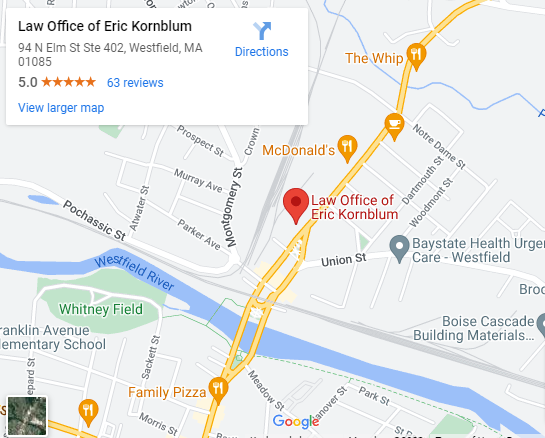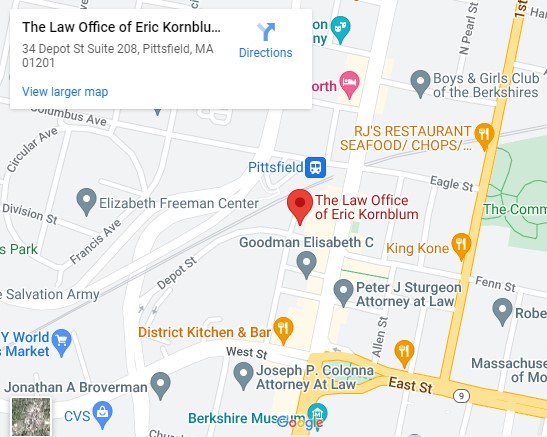Fair Debt Collection Practices Act Springfield MA
Know Your Rights to Stop Debt Harassment
The Fair Debt Collection Practices Act Springfield, MA (FDCPA) is a federal law designed to protect consumers from abusive and unfair debt collection practices. It sets guidelines and regulations for debt collectors when communicating and collecting debts.
If you reside in Springfield, MA, and are facing debt collection issues, understanding your rights under the FDCPA is essential. In such situations, the Law Office of Eric Kornblum can provide legal assistance to help you navigate the complexities of debt collection and protect your rights.
Having an experienced attorney by your side can make a difference when dealing with debt collection issues. The Law Office of Eric Kornblum has a deep understanding of the FDCPA and a proven track record of assisting clients in resolving debt collection disputes. With our experience in consumer law and debt collection practices, we can help you assert your rights and protect you from abusive tactics employed by debt collectors. Call us today to start a conversation with our attorneys.
What Are Fair Debt Collection Practices?
Fair Debt Collection Practices refer to a set of rules and guidelines established by the Fair Debt Collection Practices Act (FDCPA) to regulate the conduct of debt collectors when interacting with consumers. These practices are designed to protect individuals from abusive, deceptive, and unfair tactics employed by debt collectors during debt collection. Some key fair debt collection practices include:
- Prohibition of Harassment or Abuse: Debt collectors are prohibited from engaging in harassment, intimidation, or abusive behavior toward consumers. This includes threats, the use of profane language, repeated or excessive phone calls, or public disclosure of debt.
- Truthful and Honest Representation: Debt collectors must accurately represent themselves, their intentions, and the debt owed. They are prohibited from making false statements, misrepresenting non-payment consequences, or misleading consumers regarding their legal rights.
- Time and Place Restrictions: Debt collectors can only contact consumers at inconvenient times, such as early in the morning or late at night, if prior consent has been given. They are prohibited from getting consumers at work if the employer refuses such communication.
- Verification of Debt: Upon request from the consumer, debt collectors are obligated to verify the debt, including details of the original creditor and the amount owed. Consumers can dispute the debt and seek validation before proceeding with any payment.
Who Are Debt Collectors?
Debt collectors are individuals or companies that collect outstanding debts on behalf of creditors. They are hired by original creditors, such as banks, credit card companies, healthcare providers, or other businesses, to recover delinquent or unpaid debts from consumers.
When a consumer fails to make timely payments on a debt, the creditor may decide to outsource the task of collecting the debt to a third-party debt collection agency or hire internal debt collectors.
These debt collectors are responsible for contacting the debtor, communicating about the debt, and collecting payments.
Debt collectors may operate independently or as part of a more central debt collection agency. Some agencies focus solely on debt collection, while others offer services, including skip tracing (locating debtors), credit reporting, and debt portfolio management.
Who Are Original Creditors?
Original creditors are the entities that initially extended credit or provided services to the consumer. On the other hand, debt collectors are separate entities assigned or authorized to collect the debt on behalf of the original creditor.
What Can I Do if I Am Being Harassed by Debt Collectors?
If you are being harassed by debt collectors, you have the right to protect yourself. Here are some actions you can take:
- Familiarize yourself with your rights: Educate yourself about consumer protection laws, such as the Fair Debt Collection Practices Act (FDCPA) in the United States or similar laws in your country. Understand the restrictions placed on debt collectors and the rights granted to consumers.
- Document all communication: Keep a record of all interactions with the debt collectors, including dates, times, names of the representatives, and details of the conversations. Save any written correspondence, voicemails, or text messages.
- Request written communication: Send a written request to the debt collector, asking them to communicate with you in writing. This helps create a paper trail and reduces the chances of abusive or misleading tactics during phone calls.
- Validate the debt: Within 30 days of initial contact with a debt collector, you have the right to request verification or validation of the debt. Send a written letter requesting the debt collector to provide documentation proving that you owe the debt.
- Dispute the debt: If you believe the debt is invalid or there are errors in the amount owed, you can dispute the debt with the debt collector. Send a written letter explaining your reasons for denying the debt and include any supporting documents.
- File a complaint: If the debt collector continues to engage in harassment or violates your rights, file a complaint with the appropriate regulatory agency. You can report violations to the Consumer Financial Protection Bureau (CFPB) and your state’s attorney general’s office in the United States. In other countries, contact the relevant consumer protection or regulatory agency.
- Consult an attorney: If the harassment persists or the debt collector’s actions are particularly egregious, you may want to consult with a consumer rights attorney. They can provide legal advice, represent you in negotiations, or take legal action against the debt collector on your behalf.
What Is a Misrepresentation in Debt Collection?
A misrepresentation in debt collection refers to a deceptive or misleading statement or action employed by a debt collector while collecting a debt from a consumer. It involves providing false information, distorting facts, or using manipulative tactics to coerce the debtor into paying the debt. Misrepresentations are considered unfair and abusive practices that violate consumer protection laws
Types of Misrepresentation
The following practices are illegal and prohibited under consumer protection laws, such as the Fair Debt Collection Practices Act (FDCPA) in the United States. If you believe a debt collector has engaged in misrepresentation or other abusive tactics, consult with a consumer rights attorney and report the conduct to the appropriate regulatory authorities.
- False identity or affiliation: Misleading the debtor by falsely claiming to be an attorney, law enforcement officer, or government agency representative.
- Wrong debt amount: Inflating the amount owed by adding unauthorized fees, interest, or charges that are not legally justified or agreed upon.
- False legal action threats: Falsely threatening legal action, wage garnishment, or asset seizure without the intention or authority to follow through on such activities.
- Misleading consequences: Misrepresenting the potential effects of not paying the debt, such as stating that failure to pay will result in immediate arrest or imprisonment.
- False credit reporting: Threatening or falsely reporting negative information to credit bureaus or misrepresenting the impact of the debt on the debtor’s credit score.
- False settlement offers: Offering a settlement arrangement but misrepresenting its terms, conditions, or implications.
- Unauthorized communication: Misleadingly representing the debt collector’s authority to contact third parties, such as friends, family, or employers, about the debt.
Why Do I Need a Fair Debt Collection Lawyer in Springfield, MA?
If you are facing debt collection issues in Springfield, MA, hiring a Fair Debt Collection lawyer can be beneficial for several reasons:
- Knowledge and experience: Fair Debt Collection lawyers are well-versed in consumer protection laws, including the Fair Debt Collection Practices Act (FDCPA) and state-specific regulations. They have in-depth knowledge of your consumer rights and debt collectors’ obligations. A lawyer with experience in this area can guide you through the legal process and protect your rights.
- Legal representation: Having a lawyer by your side provides professional representation. They can communicate with debt collectors on your behalf, handle negotiations, and take legal action if necessary.
- Assessment of violations: A Fair Debt Collection lawyer can review the details of your case and determine if any violations of the FDCPA or other relevant laws have occurred. They can identify harassment, misrepresentation, or other illegal practices by debt collectors. This helps build a solid case against the debt collector and seek appropriate legal remedies.
- Protection from harassment: If you are being harassed by debt collectors, a lawyer can help end the harassment. They can send cease and desist letters to debt collectors, notifying them to stop all communication with you. If the harassment persists, your lawyer can take legal action and represent you in court if necessary.
- Negotiation and settlement: A Fair Debt Collection lawyer can negotiate with debt collectors on your behalf to reach a fair settlement. They can analyze your financial situation, explore possible options, and work towards resolving the debt issue in a reasonable and manageable manner for you.
- Legal guidance and advice: Debt collection cases can be complex, and having a lawyer can provide you with the necessary guidance and advice. They can explain your legal rights and options, answer your questions, and help you make informed decisions.
Call our Fair Debt Collection Practices Act Lawyer Now!
At the Law Office of Eric Kornblum, our team advocates for our client’s best interests. We will evaluate your situation, review the details of your debt, and provide legal advice tailored to your needs.
Whether you are facing constant harassing phone calls, threats, or false representations by debt collectors, our attorneys will work diligently to ensure your rights are respected and to seek appropriate legal remedies on your behalf. Start a conversation with us today!

 MA bankruptcy lawyer Eric Kornblum graduated from State University of New York, Binghamton in 1989 and received his law degree in 1992 at Western New England College, School of Law. Since opening his own practice, Eric has been dedicated to helping his clients resolve their financial problems both in and out of court.
MA bankruptcy lawyer Eric Kornblum graduated from State University of New York, Binghamton in 1989 and received his law degree in 1992 at Western New England College, School of Law. Since opening his own practice, Eric has been dedicated to helping his clients resolve their financial problems both in and out of court. 
